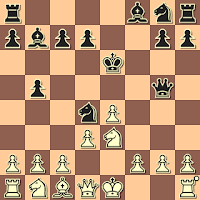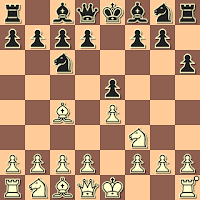Some recommended moves in the Jerome Gambit (1.e4 e5 2.Nf3 Nc6 3.Bc4 Bc5 4.Bxf7+), despite their playability, don't find their way to the chessboard.
v-trash - P-H-Pearse
3 0 blitz, lichess.org, 2020
1.e4 e5 2.Nf3 Nc6 3.Bc4 Bc5 4.Bxf7+
4...Kxf7 5.Nxe5+ Ke8
As I mentioned about 2 1/2 years ago, in "Jerome Gambit: Disease 1, Cure 0"
The major problem with this move is that it leads to a position that Black is not prepared to deal with. He may have planned to "take White out of his book" by refusing to play the "normal" 5...Nxe5, but this is one of the cases where the "cure" is worse than the "disease".
The Database has 60 games with this move, with White scoring 65%. Bill Wall has 9 wins against 0 losses.
By comparison, The Database has 87 games with the more aggressive (if "objectively" not quite as strong) 6.Qh5+, which leads to messy positions (dangerous for Black) where White scores 75%.
Personally, I am 1 - 0 - 1 with 6.Nxc6 (perrypawnpusher - rodrigojalpa, blitz 2 12, FICS 2008 [1-0, 25] and perrypawnpusher - zsilber, 2 12 blitz, FICS, 2010 [1/2 - 1/2, 43]) and 2 - 0 with 6.Qh5+ (perrypawnpusher - platel, 10 3 blitz, FICS, 2011 [1-0, 7] and perrypawnpusher - schachix, 5 3 blitz, FICS, 2013 [1-0, 10).
6...bxc6
This is a reasonable response.
Recently there has been 6...Bxf2+, getting a pawn for the Bishop that is going to be lost, anyhow: mwafakalhaswa - Ashkan -estemmm, 10 0 blitz, lichess.org, 2020 : 7.Kxf2 Qf6+ 8.Qf3 Qxf3+ 9.gxf3 dxc6 10.Nc3 Be6 11.Rg1 g6 12.d4 Ne7 13.Bg5 Rf8 14.Bxe7 Kxe7 15.Rad1 Rad8 16.d5 cxd5 17.Nxd5+ Bxd5 18.Rxd5 c6 19.Rxd8 Rxd8 20.Ke2 Ke6 21.Rd1 Rxd1 22.Kxd1 Ke5 23.Ke2 Kf4 24.c4 b6 25.b4 a6 26.a4 b5 27.axb5 axb5 28.cxb5 cxb5 29.Kf2 h5 30.h4 g5 31.hxg5 Kxg5 32.Kg3 h4+ 33.Kh3 Kh5 34.f4 Black resigned.
Likewise, we have seen 6...Qf6, as in chessmaster512 - jonjons, ultrabullet, lichess.org, 2020: 7.Ne5 Qxe5 8.d4 Qf6 9.O-O Bxd4 10.Qxd4 Qxd4 11. Be3 Qf6 12.Nc3 Ne7 13.Rad1 Ng6 14.Bd4 Qe7 15.Bxg7 Rg8 16.Nd5 Qxg7 17.Nxc7+ Kd8 18.Nxa8 Qf6 19.e5 Qc6 20.e6 b6 21.exd7 Bxd7 22.Rxd7+ Kxd7 23.Nxb6+ Kc7 24.Rd1 Qxb6 25.c4 Kc6 26.Rf1 Kc5 27.Kh1 Kxc4 28.Kg1 Kb4 29.Kh1 Qxf2 30.Rxf2 Ne5 31.Re2 Ng4 32.Re4+ Kc5 33.Rxg4 Rf8 34.h3 Rf1+ 35.Kh2 Rd1 36.Kg3 Rc1 37.Kh2 Rc2 38.Kh1 Rxb2 39.Kh2 Rxa2 40.Kh1 Ra1+ 41.Kh2 Rb1 Black won on time
The strongest reply, however - one first mentioned in "You, too, can add to Jerome Gambit theory", later "Jerome Gambit Secret #3" - is 6...Qh4. The game might continue 7.d4 Qxe4+ 8.Be3 (8.Qe2 is also possible) when things would remain quite complicated, but a bit in White's favor.
7.Qh5+ Black resigned
White will win the Bishop at c5 and be 2 pawns up.


















.png)
.png)
.png)
.png)
.png)












